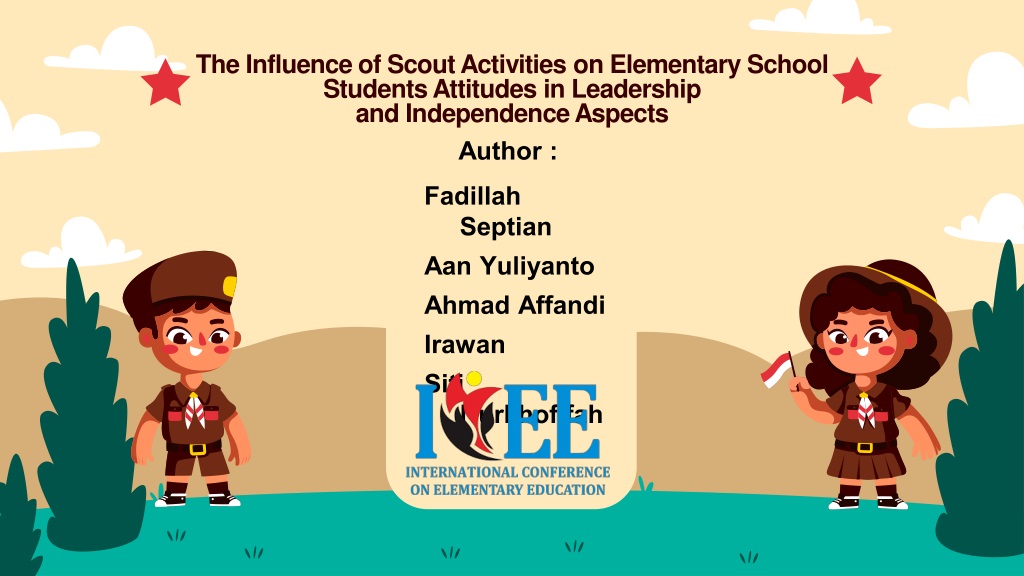

Replay
0 likes | 4 Vues
Baden Powell's student-centered approach in the Scout Movement aims to develop responsible, independent young individuals. Through extracurricular activities, including scouting, students learn valuable life skills, teamwork, and character development. Scout leaders play a crucial role in guiding and motivating students towards personal growth and societal contribution.

E N D
The Influence of Scout Activities on Elementary School Students Attitudes in Leadership and IndependenceAspects
INTRODUCTION Baden Powell has shifted the learning process to student-centered (ask the boys-students-centered) Articles of Association and Bylaws of the Scout Movement (Kwartir Nasional Gerakan Pramuka) the Scout Movement has the status of a legal entity, the Scout Movement has the main task of providing scouting education for young people to grow the nation's buds so that they become a better, more responsible generation, capable of fostering and fulfilling independence. and build a better world Each team must be responsible for the tasks assigned, the team leader will lead his team members in carrying out their tasks firmly and independently and their members must carry out their tasks with full responsibility Scouting as a Compulsory Extracurricular Activity in Primary and Secondary Education (PERMENDIKBUD No. 63 2014) Extracurricular Activities in Primary Education and Secondary Education (PERMENDIKBUD No. 62 2014)
LITERATUR REVIEW The Scout Movement is the name of an educational organization outside the school and family that uses the Basic Principles of Scout Education and Scout Education Methods. Scouting Education is the name of the activities of members of the Scout Movement. Scouts are members of the Scout Movement which consists of young members, namely Siaga, Penggalang, Penegak, Pandega, and adult members, namely Scoutmaster, Assistant Scoutmaster, Scoutmaster Trainer, Professional Coach, Pamong Saka and Saka Instructor, Saka Leader, Andalan, Helper Andalan, and Quarter Employee Staff (Anggaran Dasar Dan Anggaran Rumah Tangga Gerakan Pramuka, 2018) Extracurricular activities are curricular activities carried out by students outside of study hours, intracurricular activities, and co-curricular activities under the guidance and supervision of the education unit (Mentri Pendidikan Republik Indonesia, 2014a). Extracurricular activities are additional activities outside of class hours to enrich insight and help shape students' character so that carrying out these activities will foster motivation in students to continue learning through formal and non-formal education (Astitah et al., 2020) The author can conclude that extracurricular activities are student activities in educational units carried out outside learning hours under the guidance and supervision of the school.
LITERATUR REVIEW Scout leaders are adult members of the Scout Movement tasked with developing students in the front group, at least graduates of the Basic Advanced Course (KMD) (Anggaran Dasar Dan Anggaran Rumah Tangga Gerakan Pramuka, 2018). Scout leaders are adult members who are highly committed to the principles of Scouting Education, voluntarily work with students as partners who care about students' needs, and patiently motivate, guide, assist, and facilitate student development activities. Scouting education is a progressive independent learning process for young people to develop their whole selves, including spiritual, emotional, social, intellectual, and physical aspects as individuals and as members of society. Scouting education forms personality, life skills, and noble morals through understanding and practicing scouting values The Scouting Method is an interactive and progressive learning method that is carried out through (1) Implementation of the Scout Code of Honor; (2) Learning by doing; (3) Group activities, cooperation, and competition; (4) Interesting and challenging activity; (5) Outdoor activities; (6) The presence of adults who provide guidance, encouragement, and support; (7) Awards in the form of marks of proficiency; and Separate units for boys and girls
LITERATUR REVIEW Character is a psychological trait, morals, or manners characteristic of a person or group (Adu, 2014). Apart from that, the character can also be interpreted as a set of behaviors or behaviors of a person so that from his behavior, people will know "what he is like" (Yunarti, 2014). Quoted from other researchers, a character is an object or individual's characteristic. This characteristic is genuine and rooted in the personality of the object or individual and is the driving force behind how a person acts, behaves, says, and responds to something. (Hafid, 2018). The author can conclude that character is a fundamental characteristic of a person, which is a characteristic of a person who can differentiate himself from other people. Ron Kurtus, the founder of the "School of Champions" educational site, believes that character is a set of behaviors or behaviors of a person so that from his behavior, people will know "what he is like ."According to him, character will determine a person's ability to achieve their goals effectively, be honest and frank with others, and obey existing rules and regulations .
LITERATUR REVIEW Leadership is "a tool/instrument or process in an organization that aims to make other people want to do something voluntarily/joyfully to achieve organizational goals" (Rahmawati Ibrahim et al., 2021). The process-oriented, non-specific practices of challenging the process, inspiring a shared vision, enabling others to act, modeling the way, and encouraging the heart (Klingborg et al., 2006). Based on this quote, leadership is that leadership is the ability possessed by a person to direct and organize other people to achieve mutually agreed goals. Seven indicators of leadership attitudes taken from Ignatian leadership theory and Northouse's general leadership theory quoted from (Kurniawan, 2021) (a) Self-Awareness, Self- awareness is understanding yourself in depth; (b) Ingenuity is the power of innovation and adaptation so that we can continue to progress in an ever-changing world; (c) Love is the power to realize a peaceful, just and prosperous life together; (d) Heroism is the courage to do something that is considered suitable and persistently fighting for it; (e) Intelligence is a fundamental ability that must be possessed in leadership; (f) Self-confidence is a leadership indicator so that a leader is confident in his abilities; (g) Perseverance, which is the desire to complete work includes the characteristics of initiative, tenacity and dominance.
LITERATUR REVIEW Students can be considered independent if they can make decisions, have a sense of responsibility, and do not rely on others but believe in themselves.In the educational context, students must develop independence to facilitate the teaching and learning process so that predetermined educational goals can be achieved well. According to Maslow (Sari, 2022). independent children have several indicators: (a) Believing in their abilities; (b) Having intrinsic motivation or the urge to act that comes from within the individual; (c) being Creative and innovative; (d) Responsible for or accepting the consequences for the risks of his actions. Independence in Indonesian comes from the word independent, which means being able to stand alone and not depend on others. Independence is an individual's attitude and behavior that regulates himself and does not depend on others to complete all tasks in his life (Sari, 2022). Students can be considered independent if they can make decisions, have a sense of responsibility, and do not rely on others but believe in themselves. Quoted based on research conducted by (Sari, 2022), are as follows: (a) Able to make own decisions; (b) High self-confidence in carrying out tasks; (c) Able to make own decisions when faced with problems; (d) Has the will to compete with others to advance for his good.
DISCUSSION Leadership attitudes may emerge in leadership attitude indicators are several processes in leadership used as the basis for data dynamics (Arjuna, 2014). The collection, namely: (a) Respectful processes in question include: attitude; (b) Attitude of (a) Human relations in responsibility; (c) Mutual respect; leadership; (b) Decision-making (d) Discipline; (e) Can direct and process. Based on the be directed; (f) Honest Attitude. understanding explained above, the Independence is essential in the development of students, and when they are still dependent on other people, it can cause a feeling of lack of self-confidence and being easily influenced by others. Independence is divided into three types, namely emotional independence, behavioral independence, and value independence (Sari, 2022). By having an independent character, students are expected to be able to provide provisions for achieving students' hopes and desires.
